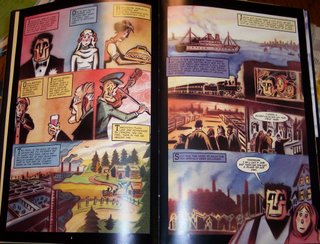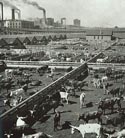Finished
 With Peter Kuper's graphic novel adaptation of the book. No surprise endings for me this time. But it's given me some momentum to get started on the actual book. I think this is going to be a frustrating read, frustrating in that it will make me angry and appeal to my sense of justice and socialist leanings.
With Peter Kuper's graphic novel adaptation of the book. No surprise endings for me this time. But it's given me some momentum to get started on the actual book. I think this is going to be a frustrating read, frustrating in that it will make me angry and appeal to my sense of justice and socialist leanings.


4 Comments:
Speaking of different editions of this book, I just grabbed what we had on the shelf. The one below is all checked out right now, but I was wondering if anyone got this version:
The Jungle : The Uncensored Original Edition
Sinclair, Upton, 1878-1968.
Summary
The Doubleday edition is cited in Books for College Libraries, 3rd ed. The current edition, predating the changes Sinclair (1878-1968) made for the original publisher of the book, includes a number of incidents deemed too gory for publication, as well as a new introduction by Kathleen De Grave explaining what was censored and why. Desperate to secure a publisher, Sinclair reluctantly edited down the original manuscript for this book. See Sharp's edition is the first to reinsert five whole chapters and additional missing passages to present the 1906 masterpiece as intended.
I just started the 'real' version last night. Got through the first chapter. And wow, it's pretty depressing. More later, when I have time to analyze.
i think i want this uncensored, gorier version. however, i'm working with a little signet classic with orange trim on the cover. kathleen de grave was a professor of mine at PSU. wonder if she's the same one?
bl
In 1904 the editors of The Appeal to Reason, a Socialist newspaper, gave Upton Sinclair $[...] and sent him to Chicago to write about the meatpacking industry. Sinclair's book, The Jungle, was subsequently published in 1905 in The Appeal and in another socialist magazine, One Hoss Philosophy, both published by J. A. Wayland.
Sinclair also got a contract with Macmillan to publish The Jungle in book form. However, the editors at Macmillan, apparently horrified at the radical nature of some of Sinclair's material, gave Sinclair a list of changes that they wanted him to make in the novel. After Sinclair made the changes, the editors at Macmillian went ahead and cancelled their contract with Sinclair anyway. The circumstances are suspicious, and it seems likely that Macmillan was pressured to drop the novel by the meatpackers.
After Macmillan cancelled its contract, Sinclair approached several other publishers. None of them were interested. Sinclair then decided to ask the readers of The Appeal to send him money for a "Subscribers edition," which he would publish himself, and which (because of the language of the subscription offering and where it appeared) would likely have been the original, uncut version of the novel. (Many 19th-century books were published by subscription, including some of Mark Twain's novels.) It seems likely that this "Subscribers edition" never got beyond the planning stage, because Sinclair didn't raise enough money to publish the book without taking a loss.
Finally, Sinclair obtained a publishing contract from another commercial publisher, Doubleday, Page. According to publisher Frank Doubleday's memoir, published in 1972 after his death, agents for the meatpacking industry threatened to sue Doubleday, Page for $[...] if they published The Jungle. Frank Doubleday, a rather prickly personality, told them to try it, and he would fight them in the courts. The meatpackers then tried bribery, offering to buy ads in all of the magazines that Doubleday, Page published if they dropped the novel. Doubleday refused.
Some people (including the editor of a recent reprint of the 1906 Doubleday, Page edition) have stated that Sinclair had plates made for the "Subscribers edition" and that these plates were handed over to Doubleday, Page, to print. This strange notion is based solely on Sinclair's claim, made much later in an interview in 1932.
In fact, there is every reason to believe that in 1932 Sinclair was misrepresenting the situation. First of all, it seems likely that Sinclair was trying to protect his reputation by hiding the fact that he had gutted his book in order to appease commercial publishers. Second, it seems very unlikely that Sinclair would have gone to the expense of creating plates before knowing that he had the money to publish the book. Third, it seems even more unlikely that Doubleday, Page would have simply used a set of plates handed to them by Sinclair. On the contrary, it's clear from Frank Doubleday's memoir that he and his editors were working from a paper manuscript. Sinclair and the editors at Doubleday, Page had numerous sessions where they very likely made extensive changes and cuts to the manuscript. Between the cuts demanded by the editors at Macmillan and the changes made by Sinclair and the editors at Doubleday, Page, the novel was cut in length by a full third.
Reading Frank Doubleday's memoir, published long after the story of how The Jungle was published had been mythologized by Sinclair, it is clear that Frank Doubleday disliked Sinclair and his novel. Doubleday only reluctantly published the novel, mainly because he felt obligated to fulfill a contract with Sinclair. Doubleday wanted a "muck racking" novel that attacked the meatpacking industry. He, no doubt, insisted that much of the Socialist propaganda be cut from The Jungle and that the novel be "toned down" so that it would appeal to a wider audience.
When The Jungle was finally published by Doubleday, Page, additional copies were printed from the same plates and sent to the people who had earlier ordered the "Subscribers edition." There is virtually no difference between the two printings, except for a small change to the cover design. This could have become a problem for Sinclair because he had taken money from people for a Socialist novel and instead gave them a book that was stripped of much of its Socialist message and was a full third shorter than the book they ordered. Sinclair could have been accused of engaging in a kind of "bait and switch" game. Finding himself in this spot, Sinclair maintained--against all the evidence--that the Doubleday, Page edition was the same as the Subscribers edition he had promised. Luckily, no one bothered to contradict him, and Doubleday's memoir, which casts doubt on Sinclair's account, came out after Sinclair's death in 1968.
In fact, Upton Sinclair's original novel was drastically edited and much of the material was cut in order to satisfy the editors at Macmillan and Doubleday, Page. To claim (as the editor of a recent reprint of the 1906 Doubleday, Page edition has) that the resulting "Commercial edition" is the version that Sinclair wanted seems deliberately obtuse. Certainly material could have been cut from the 1905 version, and probably a lot should have been cut. But the decision of what to cut was made, for the most part, by editors. There is no way to know what kind of novel Sinclair would have created if he had been left to cut the novel on his own, without pressure from the editors. It seems likely that the novel he wanted published was that which appeared in both Appeal to Reason and One-Hoss Philosophy, both with Sinclair's apparent blessing (and before he had come under pressure from commercial publishers and their editors). This is the same edition as published by See Sharp Press.
The See Sharp Press edition is better than the commercial edition because:
The See Sharp Press edition keeps intact many of the more graphic descriptions of the horrific conditions in the meatpacking industry (which might have offended a middle-class audience).
The See Sharp Press edition retains much of the ethnic material that was later diluted or cut out entirely by the editors. (Again, this would have been of little interest to a middle-class audience that wasn't particularly sympathetic to the plight of East European immigrants--this rather shocked Sinclair, who "aimed for the heart" but instead hit his readers "in the stomach").
The See Sharp Press edition retains the material on corporate crime and political corruption which was purged from the commercial edition.
The See Sharp Press edition retains The Jungle's most pointed political material--that which makes Socialist points by showing the impact of robber-baron capitalism on the lives of individual immigrants. A great deal of this material was purged from the commercial edition. (The much smaller amount of Socialist material in the commercial edition is mostly didactic in nature.)
The See Sharp press edition retains the "Socialist propaganda" in the later chapters, which is of historical interest.
Overall, the See Sharp Press edition--though not perfect--is closer to Upton Sinclair's original intentions. Even with its many flaws, it is still artistically better than the "Commercial edition" which is little more than a "bum steer."
Rather ironically, one of the editors of the Bedford/St.Martin's edition has taken it on himself to attack the See Sharp Press edition in several forums. It is ironic because St.Martins is a subsidiary of Macmillan, the company that originally contracted to publish The Jungle and then cancelled their contract with Sinclair, apparently under pressure from the meatpacking industry. The editor of the Bedford/St.Maring edition has, by attacking the See Sharp edition, revealed himself to be little more than a shill for an international media conglomerate. His willful disregard for the historical facts is, frankly, disgraceful.
Post a Comment
<< Home